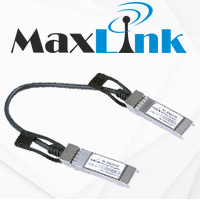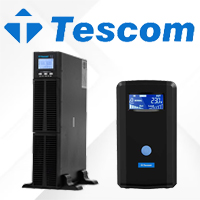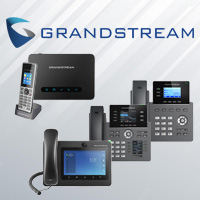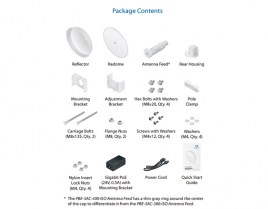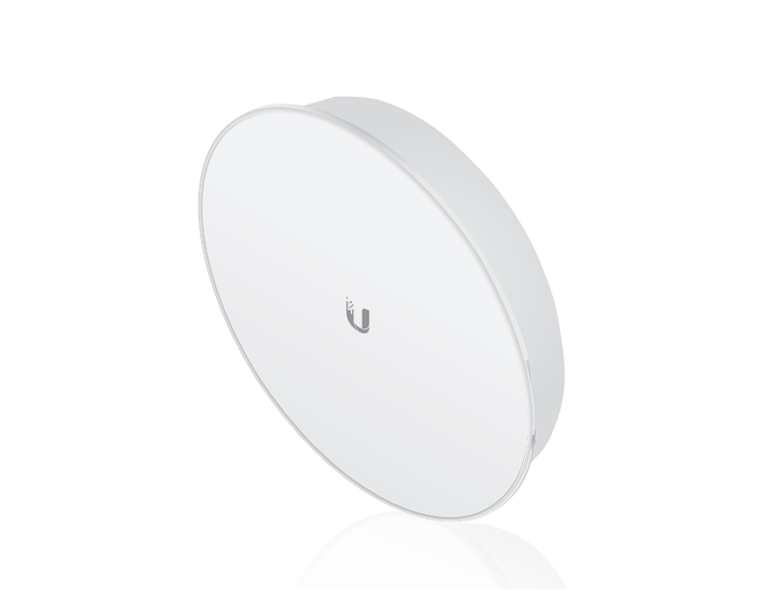
Ubiquiti PBE-5AC-400-ISO 5GHz 25dBi airMAX AC Bridge, RF Isolated

- Description
- Specifications
- Downloads
- Reviews
Overview
Ubiquiti Networks launches the PowerBeam® ac ISO, an airMAX ac Bridge that is ideal for deployments requiring maximum performance and RF isolation.
Improved Noise Immunity
The PowerBeam ac ISO directs RF energy in a tighter beamwidth, and its integrated isolator design improves RF isolation to spatially filter out interference. With its combination of focused beam directivity and RF isolation, the PowerBeam ac ISO blocks noise to improve noise immunity. This is especially important in an area crowded with other RF signals of the same or similar frequency.
Integrated Radio Design
Ubiquiti’s InnerFeed® technology integrates the radio into the feedhorn of an antenna, so there is no need for a cable. This improves performance because it eliminates cable losses.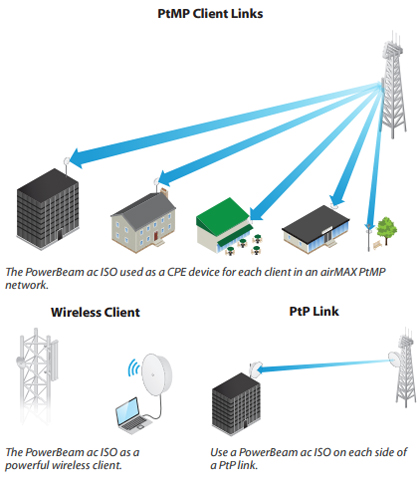
Software
airOS 7
Sporting an all-new design for improved usability, airOS® v7 is the revolutionary operating system for Ubiquiti® airMAX ac products.
Powerful Wireless Features
• airMAX ac Protocol Support
• Long-Range Point-to-Point (PtP) Link Mode
• Selectable Channel Width
- PtP: 10/20/30/40/50/60/80 MHz
- PtMP: 10/20/30/40 MHz
• Automatic Channel Selection
• Transmit Power Control: Automatic/Manual
• Automatic Distance Selection (ACK Timing)
• Strongest WPA2 Security
Usability Enhancements
• Dynamic Configuration Changes
• Instant Input Validation
• HTML5 Technology
• Optimization for Mobile Devices
• Detailed Device Statistics
• Comprehensive Array of Diagnostic Tools, including Ethernet Cabling Test, RF Diagnostics, and airView® Spectrum Analyzer
Advanced RF Analytics
airMAX ac devices feature a multi-radio architecture to power a revolutionary RF analytics engine.
An independent processor on the PCBA powers a second, dedicated radio, which persistently analyzes the full 5 GHz spectrum and every received symbol to provide you with the most advanced RF analytics in the industry.
Data from the spectrum analysis and RF performance monitoring is displayed on the Main tab and airView Spectrum Analyzer of airOS V7.
Real-Time Reporting
The Main tab displays the following RF information:
• Persistent RF Error Vector Magnitude (EVM) constellation diagrams
• Carrier to Interference-plus-Noise Ratio (CINR) histograms
• Signal-to-Noise Ratio (SNR) time series plots
Spectral Analysis
airView allows you to identify noise signatures and plan your networks to minimize noise interference. airView performs the following functions:
• Constantly monitors environmental noise
• Collects energy data points in real‑time spectral views
• Helps optimize channel selection, network design, and wireless performance
airView runs in the background without disabling the wireless link, so there is no disruption to the network.
In airView, there are three spectral views, each of which represents different data.
• Waterfall Aggregate energy over time for each frequency.
• Waveform Aggregate energy collected.
• Ambient Noise Level Background noise energy shown as a function of frequency
Available with a firmware upgrade to airOS v7.1, airView provides powerful spectrum analyzer functionality, eliminating the need to rent or purchase additional equipment for conducting site surveys.
Technology
AirMAX ac
Unlike standard Wi-Fi protocol, Ubiquiti's Time Division Multiple Access (TDMA) airMAX protocol allows each client to send and receive data using pre-designated time slots scheduled by an intelligent AP controller.
This time slot method eliminates hidden node collisions and maximizes airtime efficiency, so airMAX technology provides performance improvements in latency, noise immunity, scalability, and throughput compared to other outdoor systems in its class.
Intelligent QoS Priority assigned to voice/video for seamless streaming.
Scalability High capacity and scalability.
Long Distance Capable of high‑speed, carrier-class links.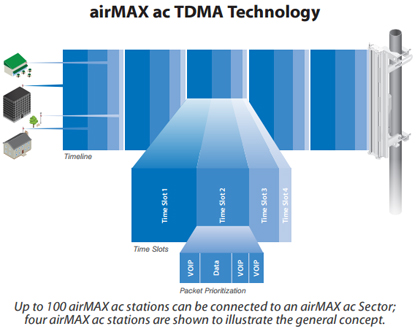
Superior Performance
The next-generation airMAX ac technology boosts the advantages of our proprietary TDMA protocol.
Ubiquiti's airMAX engine with custom IC dramatically improves TDMA latency and network scalability. The custom silicon provides hardware acceleration capabilities to the airMAX scheduler, to support the high data rates and dense modulation used in airMAX ac technology.
Throughput Breakthrough
airMAX ac supports high data rates, which require dense modulation: 256QAM – a significant increase from 64QAM, which is used in airMAX. With their use of proprietary airMAX ac technology, airMAX ac products supports up to 450+ Mbps real TCP/IP throughput – up to triple the throughput of standard airMAX products. 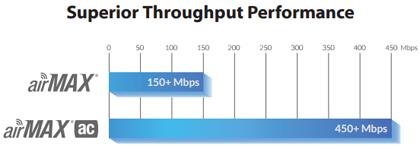
Hardware Overview
Innovative Mechanical Design
• Metal-plated interior of rear housing Enhances RF shielding.
• Built-in mechanical tilt The mounting bracket offers ± 20° of tilt.
• Convenient pole-mounting Only a single wrench is needed to mount the PowerBeam ISO on a pole.
Industrial-Strength Construction
• Fasteners GEOMET-coated for improved corrosion resistance when compared with zinc-plated fasteners.
• Dish and brackets Made of galvanized steel that is powder‑coated for superior corrosion resistance.
• Protective radome Shields the radio from nature's harshest elements.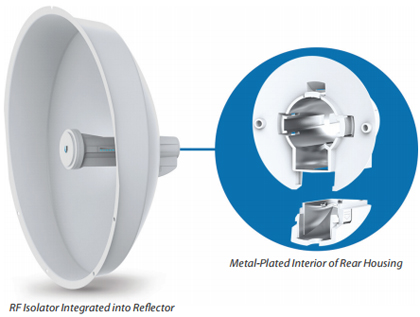
Breakthrough RF Isolation
The integrated isolator design spatially filters out interference, so the PowerBeam ISO delivers improved noise immunity in co-location deployments.
Compare the two near-field plots below, and note the superior performance of the integrated RF isolator.
Both near-field plots are displayed in watts and use a linear scale. The strength of the electromagnetic field is color-coded:
• Red: Highest strength
• Green: Medium strength
• Indigo: Lowest strength
| Caution! According to current Greek Legislation, of N.F.B.A.R. and the provisions of the P.D. 98/2017 the lawful use of this product in the frequency band 5470 – 5725MHz, provides for a maximum transmit power of 1 W e.i.r.p. At this maximum power the output power of the transmitter and the gain of the antenna are both taken into account. Responsible for spectrum surveillance is H.T.P.C. This product is CE marked, P.D. 98/2017 This product is intended for outdoor use. |
| Warranties - Returns: | |
| Money Return: | Repair - Replacement: |
| 20 days | 24 months |
| Specifications | |
| Dimensions | 459 x 459 x 261 mm |
| Weight | 3.22 kg |
| Power Supply | 24V, 0.5A Gigabit PoE |
| Power Method | Passive PoE (Pairs 4, 5+; 7, 8 Return) |
| Supported Voltage Range | 20-26VDC |
| Max. Power Consumption | 8.5W |
| Operating Frequency | 5150 - 5875 MHz |
| Gain | 25 dBi |
| Networking Interface | (1) 10/100/1000 Ethernet Port |
| Processor Specs | Atheros MIPS 74Kc, 560 MHz |
| Memory | 64 MB DDR2, 16 MB Flash |
| LEDs | (1) Power, (1) LAN, (4) WLAN |
| Signal Strength LEDs | Software-Adjustable to Correspond to Custom RSSI Levels |
| Channel Sizes | PtP Mode: 10/20/30/40/50/60/80 MHz PtMP Mode: 10/20/30/40 MHz |
| Max. VSWR | 1.5:1 |
| Built-In Mechanical Downtilt | ± 20° |
| Polarization | Dual Linear |
| Enclosure | Outdoor UV Stabilized Plastic |
| Mounting | Pole-Mount Kit Included |
| Wind Loading | 559 N @ 200 km/h |
| Wind Survivability | 200 km/h |
| ESD/EMP Protection | Air: ±24 kV, Contact:± 24 kV |
| Operating Temperature | -40 to 70° C |
| Operating Humidity | 5 to 95% Noncondensing |
| Wireless Approvals | FCC, IC, CE |
| RoHS Compliance | Yes |
| Salt Fog Test | IEC 68-2-11 (ASTM B117), Equivalent: MIL-STD-810 G Method 509.5 |
| Vibration Test | IEC 68-2-6 |
| Temperature Shock Test | IEC 68-2-14 |
| UV Test | IEC 68-2-5 at 40° C (104° F), Equivalent: ETS 300 019-1-4 |
| Wind-Driven Rain Test | ETS 300 019-1-4, Equivalent: MIL-STD-810 G Method 506.5 |
YOU HAVE SEEN RECENTLY

















